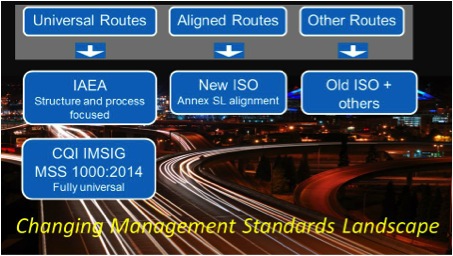In the February 2015 issue of Quality Progress, John West and Charles Cianfrani imply that ISO 9001:2015 will result in a change in the quality format. However, it will merely be an adjustment. The inference is that quality will still dominate. One might expect that approach in the American Society of Quality’s (ASQ) primary journal. However, this raises the question posed in the title. Is one approach going to dominate the other? There are partisans on each side. In an earlier article, I postulated that it is actually a symbiotic relationship. However, a closer examination of the foundation and difficulties associated with the Quality Improvement Process and Risk Analysis should put the issue in a better perspective. Continue reading
Category Archives: ISO9001:2015@Risk™ – Greg Hutchins
#85 – CAN THIS SHIP BE TURNED AROUND IN SIX MONTHS – T. DAN NELSON
 If ISO 9001:2015 is effectively applied, auditors will no longer use a clause-by-clause approach to auditing QMSs. Dr. Croft of TC 176 addresses this issue directly while answering a question about the difference in audit approach expected of ISO 9001:2015. Continue reading
If ISO 9001:2015 is effectively applied, auditors will no longer use a clause-by-clause approach to auditing QMSs. Dr. Croft of TC 176 addresses this issue directly while answering a question about the difference in audit approach expected of ISO 9001:2015. Continue reading
#84 – CHANGES IN FUTURE MANAGEMENT SYSTEM STANDARDS – IAN DALLING
 “It must be remembered that there is nothing more difficult to plan, more doubtful of success, nor more dangerous to manage than a new system. For the initiator has the enmity of all who would profit by the preservation of the old institution and merely lukewarm defenders in those who gain by the new ones. ” Niccolò Machiavelli Continue reading
“It must be remembered that there is nothing more difficult to plan, more doubtful of success, nor more dangerous to manage than a new system. For the initiator has the enmity of all who would profit by the preservation of the old institution and merely lukewarm defenders in those who gain by the new ones. ” Niccolò Machiavelli Continue reading
#83 – RESILIENCE: THE EVOLUTION OF RISK MANAGEMENT – GREG CARROLL
 In the last decade we have seen the evolution of Risk Management from an administrative practice to ERM for corporate governance. But the realization that results come out of action not protection, people have started pursuing a more proactive role for risk management. Continue reading
In the last decade we have seen the evolution of Risk Management from an administrative practice to ERM for corporate governance. But the realization that results come out of action not protection, people have started pursuing a more proactive role for risk management. Continue reading
#83 – VALUE OF BACKFILLING A RISK REGISTER – T. DAN NELSON
Let’s say Pete’s company has been in business for over thirty years. Now ISO 9001:2015 comes out requiring risk-based thinking. Does that mean Pete must therefore engage in formal risk management, and that management must use a risk assessment tool to provide evidence of risk-based thinking? Continue reading
